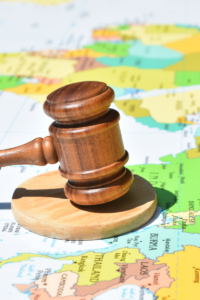International Child Abduction: How to Win a Hague Convention Case
International parental child abduction cases are among the most emotionally charged and legally complex disputes in family law. In 2023, 4.1% of the 28,886 missing children cases reported to the National Center for Missing & Exploited Children (NCMEC) were classified as family abductions—highlighting the prevalence and gravity of this issue.
The Hague Convention on the Civil Aspects of International Child Abduction provides a vital framework to address these cross-border disputes. However, navigating a Hague Convention case requires meticulous preparation, a comprehensive understanding of the law, and skilled legal representation.
In this blog, we’ll delve into the workings of the Hague Convention, outline effective strategies for winning a case, and demonstrate how Masters Law Group’s extensive experience can guide parents in reuniting with their children.
Understanding the Hague Convention
The Hague Convention on the Civil Aspects of International Child Abduction is a treaty established in 1980 to provide a standardized process for resolving international parental abduction cases. The Hague Conference on Private International Law (HCCH) includes 91 permanent members, comprising 90 countries and the European Union. All members agree to adhere to the Convention’s guidelines, helping ensure a unified approach to protecting children from wrongful removal or retention.
The core objectives of the Hague Convention include:
- Prompt Return: To help ensure the swift return of abducted children to their country of habitual residence.
- Deterrence: To prevent parents from using international borders to gain an advantage in custody disputes.
Steps in a Hague Convention Case
1. Filing a Hague Petition
The first step in a Hague Convention case is for the left-behind parent to file a petition in the country where the child is currently located. This is a critical legal document that initiates the process and sets the stage for the case. The petition must establish the following key elements:
- The child is under 16 years of age.
- The child’s habitual residence before the abduction.
- The violation of custody rights under the child’s habitual residence laws.
2. Proving Wrongful Removal or Retention
The petitioner bears the responsibility of proving that the child’s removal or retention was wrongful under the Hague Convention. To do so, they must demonstrate two critical elements:
- Custodial rights were being actively exercised at the time of the abduction: This could involve showing evidence of regular involvement in the child’s life, such as visitation, financial support, or shared decision-making.
- The child was wrongfully removed or retained: The petitioner must establish that the child’s relocation violated custody rights recognized under the laws of the habitual residence.
 Courts require clear and convincing evidence to support these claims. This may include legal documentation, witness testimony, or authoritative interpretations of custody laws in the child’s habitual residence. Collaborating with an experienced Hague Convention attorney can help your case be thoroughly prepared and presented effectively.
Courts require clear and convincing evidence to support these claims. This may include legal documentation, witness testimony, or authoritative interpretations of custody laws in the child’s habitual residence. Collaborating with an experienced Hague Convention attorney can help your case be thoroughly prepared and presented effectively.
3. Defending Against Exceptions
While the Hague Convention prioritizes the prompt return of abducted children, it also provides limited defenses for the abducting parent. These defenses are not meant to re-litigate custody but to address exceptional circumstances. The most common defenses include:
- There is a grave risk of harm if the child is returned.
- The child has settled into the new environment (if over a year has passed since the abduction).
- The child objects to returning and has reached an age and maturity to make such decisions.
Defenses under the Hague Convention are narrowly construed, and the burden of proof lies with the abducting parent to substantiate their claims. Courts carefully evaluate these exceptions to prevent help misuse and ensure the child’s best interests are protected.
Strategies for Success in Hague Convention Cases
1. Act Quickly
Time is critical in Hague Convention cases. Courts are more likely to return a child if the case is filed within one year of the abduction. Delays may result in the child becoming “settled” in their new environment, complicating the case.
2. Gather Robust Evidence
Establishing habitual residence and wrongful removal requires strong evidence, such as:
- School or daycare records.
- Medical and vaccination records.
- Testimonies from friends, teachers, or community members familiar with the child’s living situation.
3. Address Potential Defenses Proactively
If the abducting parent raises defenses under the Hague Convention, be prepared to counter these arguments. For example:
- If claiming grave risk of harm, provide evidence that the child will be safe in their habitual residence.
- If the child objects to returning, demonstrate that the abducting parent may have influenced the objection.
4. Work with Experienced Legal Counsel
Navigating a Hague Convention case requires in-depth legal knowledge. Working with a law firm experienced in international parental child abduction cases, like Masters Law Group, can significantly improve your chances of success.
How Masters Law Group Can Help 
At Masters Law Group, we understand the profound emotional and legal challenges involved in Hague Convention cases. With extensive experience representing clients in international parental child abduction disputes, we are dedicated to guiding you through these complexities with care and expertise.
Our attorneys have successfully handled numerous Hague Convention cases, delivering favorable outcomes for parents seeking the return of their children. We provide comprehensive support at every stage of the Hague Convention process, from filing the initial petition to representing you in court. Here’s how we can help:
- Collect and present compelling evidence to prove wrongful removal or retention.
- Develop strategies to address and counter defenses raised by the opposing party.
- Advocate effectively in court to secure the prompt return of your child.
Explore our proven track record and expertise in this area of law by reviewing our case successes here.
Final Thoughts
International parental child abduction cases present significant emotional and legal challenges, but the Hague Convention provides a framework for parents to seek justice. Act swiftly is essential if you want to increase your chances of success.
At Masters Law Group, we are committed to helping parents navigate the complexities of Hague Convention cases. With a proven track record and a client-focused approach, our team is dedicated to reuniting families and providing the best outcomes for children. Let us guide you through this challenging time and help bring your child home.
Contact our Hague Convention attorneys today to schedule a consultation.
Frequently Asked Questions (FAQs)
Q: How long do Hague Convention cases typically take?
A: The Hague Convention aims to resolve cases within six weeks to prevent further disruption to the child’s life. However, delays can occur due to court backlogs, the complexity of the case, or challenges in gathering evidence. Working with the experienced attorneys at Masters Law Group can help streamline the process and avoid unnecessary delays.
Q: What if the child has dual citizenship?
A: Dual citizenship does not affect the protections of the Hague Convention. The key factor is the child’s habitual residence, not citizenship. Masters Law Group can help clarify its impact on your case and ensure your petition aligns with the Convention.
Q: Can I file a Hague Convention case if I don’t have a formal custody order?
A: The Hague Convention recognizes custody rights that arise naturally under the child’s habitual residence laws, even without a formal custody order. However, proving these rights may require additional evidence, such as legal statutes or documentation of parental involvement. Masters Law Group can assist in gathering the necessary proof to establish your custody rights.
Q: What happens if the child refuses to return?
A: If the child is of sufficient age and maturity, the court may consider their objections to returning. However, the court will also examine whether these objections are genuine or influenced by the abducting parent. Masters Law Group has experience handling these sensitive cases and can present evidence to help the child’s voice be heard appropriately and fairly.




